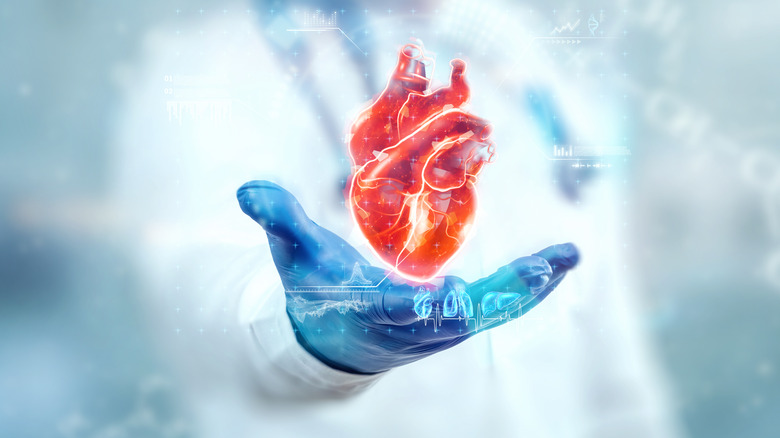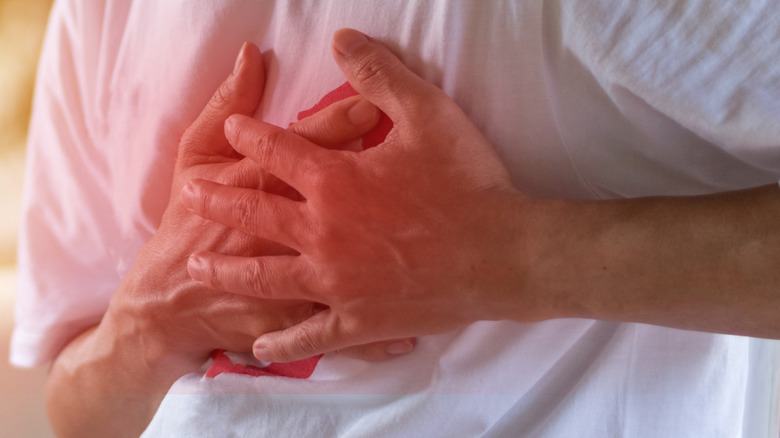The First Thing You Should Do When Your Heart Starts Racing
The sight of your crush. The anticipation while you watch a scary movie. The steep climb to the top of that first drop on a roller coaster. Just the mere thought of these things is enough to get the heart racing. While our society often uses the phrase to describe some of life's most exhilarating moments, by literal definition, a racing heart is far from a good thing.
Nevertheless, not every instance of a racing heart is a sign of danger. Elevating your heart rate is actually necessary sometimes — but we'll get to that in a bit.
In terms of an unhealthy heart rate, there are several factors that can cause your heart to race. Let's take a look at how your lifestyle and medical history play a role, how to identify a racing heart, and what measures to put into place to help ensure your heart rate stays in a healthy zone.
When a racing heart is normal
According to the Mayo Clinic, the medical term for a racing heart is tachycardia, and it's used to describe a heart rate that's over 100 beats per minute. Tachycardia is brought on by irregular heart rhythms or heart palpitations known as arrhythmias. With that being said, anyone who knows what it's like to get in a good HIIT session is prone to experiencing a heart rate that high. Even then, however, knowing your maximal heart rate is key to making sure your workout is safe.
Another instance in which the heart rate may elevate beyond 100 beats per minute is when you're in danger. When you're in a flight-or-fight situation, for example, your heart rate may hover between 115-140 beats per minute to support quick reactions and rapid thinking, per Science Line. This happens as the sympathetic nervous system responds to what is perceived to be a dangerous or stressful situation, according to Live Science.
Sinus tachycardia is another form of increased heart rate that is entirely normal, per MedicalNewsToday. While stress or exercise can bring it on, it can also develop as a result of pain or fever.
Causes and symptoms of a racing heart
Lifestyle can play a huge role in tachycardia — the Cleveland Clinic states that it's often caused by stress, consuming too much caffeine or alcohol, not getting plenty of sleep, and using tobacco products. Cutting these bad habits out of your daily routine can help significantly reduce the risk of having to battle tachycardia. As a result, not only will the vitality of your heart improve, but your overall well-being will benefit from removing toxic and destructive behaviors.
Other causes of tachycardia may involve problems that are beyond your control and have nothing to do with your lifestyle. These problems include cardiomyopathy (a hereditary heart muscle disease), heart attack, heart disease, general heart issues, lack of sufficient blood in the coronary arteries, and even some medicines. In these cases, taking proper preventative measures can still help alleviate the chance of tachycardia affecting your life.
The Cleveland Clinic also identifies shortness of breath, chest pain, dizziness, lightheadedness, or fainting as symptoms of tachycardia.
What to do if your heart is racing
Most of the work in caring for your heart is done before issues begin, which is one of the reasons why it's so important to prioritize self-care. However, it's never too late to start making your heart health a priority.
Considering the Mediterranean Diet (which has been deemed the best diet for heart health), drinking lemon water every day, or seeing a therapist regularly to minimize stress, anxiety, and depression, are ideal for preventing tachycardia.
When you're dealing with a racing heart, WebMD recommends taking 3 action steps: take deep breaths, splash cold water on your face, and try not to panic. Inhaling through the nose and exhaling through the mouth in a slow, controlled manner will help ease tension and allow you to relax. Splashing cold water on your face actually arouses a nerve that governs the rate of your heart. By staying calm, you can also avoid adding stress to the situation.
If you feel the need to call 9-1-1, do it. While most heart palpitations don't generally cause heart attack, according to GoodRx, tachycardia can result in complications in extreme cases (per the American Heart Association).



